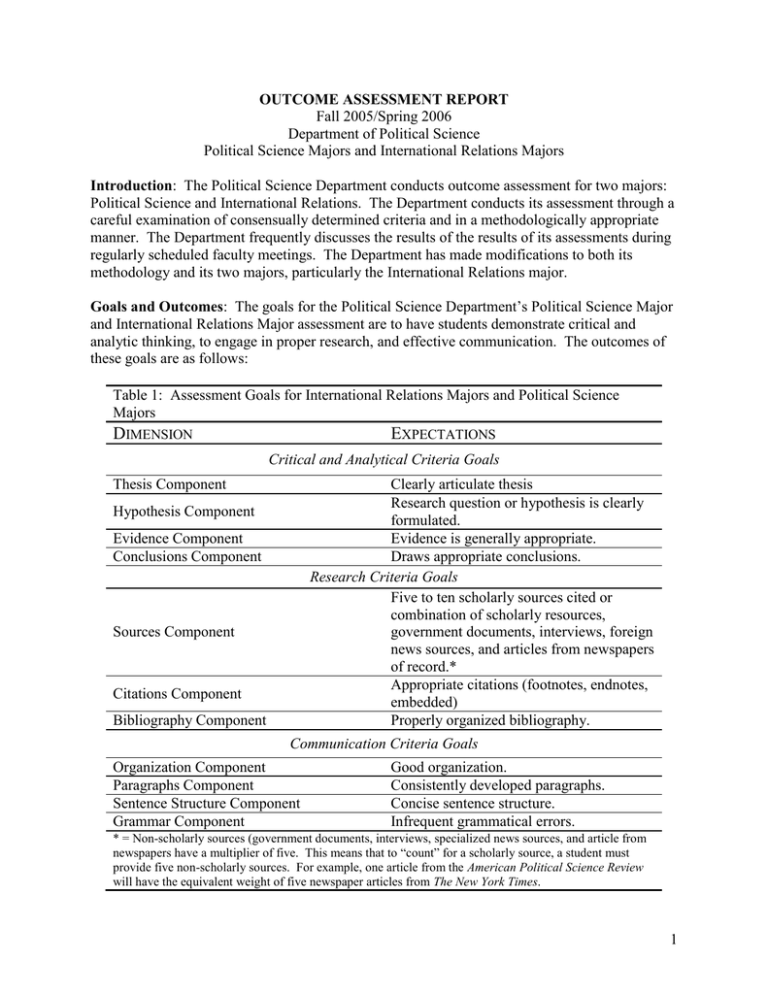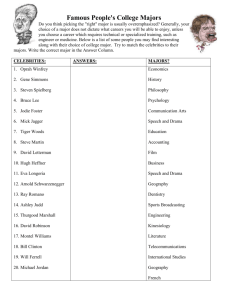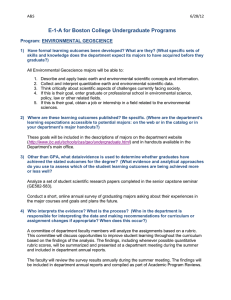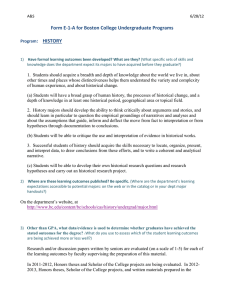Fall 2005/Spring 2006 Department of Political Science OUTCOME ASSESSMENT REPORT
advertisement

OUTCOME ASSESSMENT REPORT Fall 2005/Spring 2006 Department of Political Science Political Science Majors and International Relations Majors Introduction: The Political Science Department conducts outcome assessment for two majors: Political Science and International Relations. The Department conducts its assessment through a careful examination of consensually determined criteria and in a methodologically appropriate manner. The Department frequently discusses the results of the results of its assessments during regularly scheduled faculty meetings. The Department has made modifications to both its methodology and its two majors, particularly the International Relations major. Goals and Outcomes: The goals for the Political Science Department’s Political Science Major and International Relations Major assessment are to have students demonstrate critical and analytic thinking, to engage in proper research, and effective communication. The outcomes of these goals are as follows: Table 1: Assessment Goals for International Relations Majors and Political Science Majors DIMENSION EXPECTATIONS Critical and Analytical Criteria Goals Thesis Component Clearly articulate thesis Research question or hypothesis is clearly formulated. Evidence is generally appropriate. Draws appropriate conclusions. Research Criteria Goals Five to ten scholarly sources cited or combination of scholarly resources, government documents, interviews, foreign news sources, and articles from newspapers of record.* Appropriate citations (footnotes, endnotes, embedded) Properly organized bibliography. Hypothesis Component Evidence Component Conclusions Component Sources Component Citations Component Bibliography Component Communication Criteria Goals Organization Component Paragraphs Component Sentence Structure Component Grammar Component Good organization. Consistently developed paragraphs. Concise sentence structure. Infrequent grammatical errors. * = Non-scholarly sources (government documents, interviews, specialized news sources, and article from newspapers have a multiplier of five. This means that to “count” for a scholarly source, a student must provide five non-scholarly sources. For example, one article from the American Political Science Review will have the equivalent weight of five newspaper articles from The New York Times. 1 The goals and outcomes were developed in a subcommittee consisting of Dr. Schulz, Dr. Charlick and Dr. Elkins during the spring of 2003. The goals and outcomes were presented to the entire Department for approval. The goals and outcomes were refined by the full department and approved by the department in late spring of 2003. The goals and have been modified once since the approval. The 2004 Assessment Report indicated “We question how you are measuring “diction” using a written paper” (Page 6). The department agreed with the Assessment Team’s suggestion and removed the criteria as a goal. Research Methods: The method of assessment is based on students demonstrating outcomes as indicated by their final papers in the Department’s senior seminars. The faculty members teaching a senior seminar submit unmarked and anonymous final papers from each senior seminar to the chair. The student assessment coordinator randomly selects from these papers a representative sample to distribute to paired teams of reviewers. The reviewers are fulltime faculty members in the Political Science Department that did not teach senior seminars (faculty members that did teach senior seminars are excluded from the pool of reviewers). The reviewers are randomly assigned to two-person review teams. The reviewers assess each paper using an instrument measuring the outcomes of the discrete components of the goals (see Appendix A Electronic Attachment). The measurement instrument was modified between the spring and the fall of 2003 to increase the level of inter-coder reliability by increasing the number of measurement categories: Figure 1: Illustration of Spring 2003 and Fall 2003 to Present Student Assessment Instruments Spring 2003 Measurement Instrument Exceeds Expectations Meets Expectations Does Not Meet Expectations 3 2 1 Fall 2003 to Current Measurement Instrument Exceeds Expectation 5 4 Meets Expectations 3 Does Not Meet Expectations 2 1 The Review of the Department’s assessment instrument by the Office of Assessment indicated that the rating instrument should have only three categories (Research 8. “Consider having three rates for each paper.”) The Department has only three rates for each paper, as indicated above. However, it allows faculty member reviewers to select scoring categories that indicated a feature of an assessment component that may not completely meet its target expectation, while granting that it either excelled or was deficient in some degree of this feature. As figure 2 illustrates, the result has been a modest, but inconsistent, improvement in the intercoder reliability scores for the teams of reviewers 2 Figure 2: Intercoder Reliability by Semester Assessment Period 0.8 0.7 0.67 0.6 0.54 Correlation Value 0.5 0.5 0.4 0.31 0.3 0.22 0.2 0.1 0 Fall 2003 Spring 2004 Fall 2004 Spring 2005 Fall 2005 Semester Correlation Coefficient As noted above, the department altered its measurement instrument in the fall of 2005 to correspond to suggestions made by the Office of Assessment. The Office of Assessment noted, “We question how you are measuring “diction” using a written paper.” The Department eliminated this feature from the rating form. Findings: The empirical data are compiled by the assessment coordinator in a numeric format based on the results evaluations provided by the assessment review teams. The assessment coordinator writes an assessment report outlining the methods, diagnostics of the analysis, and the results of the assessment. The Political Science Department has produced five reports based on its current assessment process.1 Figure 3 illustrates the findings of five iterations of student assessment and, in general, indicates that the majority of Political Science Majors and International Relations Majors are meeting or exceeding departmentally established goals. The department is currently conducting its review of senior seminar final papers for the spring 2006 semester. The report will be distributed in the fall of 2006 and discussed at the first departmental faculty meeting. 1 Spring 2005 and Fall 2005 Assessment Reports were submitted along with this document. Earlier Assessment Reports are available upon request to the Department of Political Science. The reports can only be provided in hardcopy due to the loss of digital versions. 3 Figure 3: Percent Criteria Exceeding and Meeting Expectations, Fall 2003 to Fall 2005 90 80 70 Percent 60 50 40 30 20 10 0 Critical and Analytical Research Articulate and Communicate Criterion Fall 2003 Spring 2004 Fall 2004 Spring 2005 Fall 2005 Review: Students are involved in two general ways. First, students are involved in the review process by their submission of senior seminar papers to the instructor of record. Second, faculty members teaching senior seminars frequently inform students of the nature of student assessment and the department’s goals. All fulltime faculty members are involved in the review process either as instructors in senior seminars or as reviewers for the purpose of student assessment. Reports are distributed to faculty members and discussed in subsequent department faculty meetings. Action: The Department has determined that the guidelines for the International Relations majors do not clearly enough indicate the proper sequencing of the senior seminar. International Relations majors may take the seminar according to current guidelines, as if it were a regular course. The idea, however, is that the senior seminar is a capstone course. The Department has directed the chair to take steps to articulate clearly that the senior seminar is a capstone course and should only be taken near the completion of the degree, specifically after the student has completed the core and track requirements. The chair informs International Relations Majors during the advising process that senior seminars are capstone courses. In addition, all students, both Political Science Majors and International Relations Majors, must have authorization to enroll in a senior seminar. As part of the senior seminar enrollment process, the department reviews a student’s file and determines whether she has met core requirements for her major before allowing her to enroll. At the most recent faculty meeting (May 3, 2005) the Department decided that it must study further ways to improve its student assessment for its two majors (Political Science Major and International Relations Major). After successive iterations of student assessment a pattern is emerging about the proper course of action to address this problem. The problem appears to be 4 that International Relations Majors are not required to take a research methods and data analysis course as part of their curriculum. Figure 3 illustrates the percent of randomly selected papers reviewed as part of student assessment that either met or exceeded departmental goals (the bar in the chart) and the percent of the total number of students in those senior seminars that had taken the department’s data analysis course (the trend line in the chart), PSC 251 Introduction to Data Analysis. Figure 4: Percent of Papers Meeting or Exceeding Critical and Analytical Criteria and Percent of All Students in Senior Seminars Completing PSC 251 Introdcution to Data Analysis, Fall 2003 to Fall 2005 80 70 66 66.7 70.3 60 54.8 Percent 50 46.9 47.9 44.4 40 35.4 31.9 30 26.7 20 10 0 Fall 2003 Spring 2004 Fall 2004 Spring 2005 Fall 2005 Semester Critical and Analytical Percent in Data Analysis Action Plan: The department wants to hold a faculty retreat to discuss various options to address this issue. Among initially proposed options are: (1) eliminate the Critical and Analytical criteria, (2) revise criteria measurement, (3) increase research methods component in 300-level courses, (4) assign a research paper writing text in seminars, (4) require methods course for International Relations Majors. The department chair will attempt to arrange such a retreat if time and expenses allow. 5



